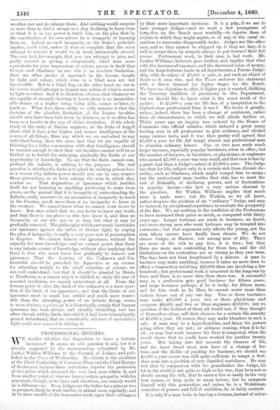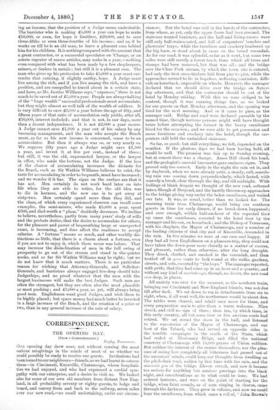PROFESSIONAL INCOMES.
WE wonder whether the disposition to leave a fortune increases ? It seems an odd question to ask, but it is directly suggested by the memorandum submitted by Mr. Justice Watkin Williams to the Council of Judges, and pub- hailed in the Times of Wednesday. He objects to the abolition of the Chief Justiceship of Common Pleas and the Chief Barony of Exchequer, because these reductions deprive the profession of two prizes which attracted the very best men within it, and from another point of view we have a certain sympathy with his argument, though, as we have said elsewhere, our remedy would be a different one. Even Judges are the better for a prize or two in prospect, likely to work harder, to attend more regularly, and to be more careful of the impression made upon their colleagues
by their more important decisions. It is a pity, if we are to have younger Judges—and we want a few youngsters of forty-five on the Bench most woefully—to deprive them of objects to which they might aspire, or of any of the usual in- centives to encounter disagreeable tasks. Judges are like other men, and as they cannot be whipped up if they are lazy, it is well to tempt them by rewards always to put forward their full power. Perfunctory work, in their case, is bad work. Mr. Justice Williams, however, goes further, and implies that what with the increase of expenses, and the decreased value of money, and the large fortunes made in all departments, a Puisne Judge- ship, with its salary of £5,000 a year, is not such an object of desire as it once was, and the Times endorses his statement with a direct demand for higher wages for the Bench. We have no objection to offer, if higher pay is wanted, disliking the Treasury tradition of parsimony in this Department, but we should like to know what is the exact truth of the matter. Is £5,000 a year for life less of a temptation to the highest-class professional than it was ? We doubt it greatly, unless, indeed, there has been a change of sentiment, rather than of circumstances, to which we will allude farther on. Thirty years ago an inquiry was ordered by the House of Commons into official salaries, which induced a great many leading men in all professions to give evidence, and elicited many curious facts, and it was then pretty well agreed that £5,000 a year for life did tempt almost any professional man to abandon ordinary labour. One or two men made much larger incomes, especially popular barristers, when in office ; but the number of lawyers, or barristers,- or physicians, or engineers who earned £7,000 a year was very small, and that sum is less by a great deal than a Judge's salary of £5,000 a year. The Judge has that for life, subject only to a certain risk from chronic dis- ability, such as blindness, which might compel him to resign ; but the professional man, besides that risk, has to meet the risk of ill-health, of declining powers, and of fluctuations in popular favour,—the last a very serious element in the question. Sir Watkin Williams implies that much more is made now ; but Sir Watkin, as we all know, rather despises the position of an " ordinary " Judge, and may be induced, by exceptional experience, to overrate the prosperity of the Bar. We see nothing in the condition of the Professions to have increased their gains so much, as compared with thirty years ago. Larger fortunes are made in business, no doubt, and more strong men who want fortunes may be tempted into commerce ; but that argument only affects the young, not the men whose careers have finally been chosen. We do not choose Judges at Harrow, but among men of fifty. There are more of the rich to pay fees, it is true ; but then there are more men contending for those fees, and the old limitations on the contention are as strong as they ever were. The days have not been lengthened by a minute. A man in business may make anything, because it takes no more time to effect a transaction involving 220,000 than one involving a few hundreds ; but professional work is measured in the long-run by time, and there is no more time than there was. A successful man in a profession gets good business for fifteen years, and large business perhaps, if he is lucky, for fifteen more, and let him work as he likes, he cannot screw more them. sixteen hours out of any one day. Two or three barristers may make £15,000 a year, two or three physicians and surgeons £8,000, and two or three engineers 210,000; but we question if the luckiest of them all would not, if they thought of themselves alone, sell their chances for a certain life annuity of £5,000 a year. Of course, they may make blunders in such a sale. A man may be a hypochondriac, and fancy his powers going, when they are not ; or sickness coming, when it is far off ; or may fear work because his liver is congested, when the result shows that he could have worked for another twenty years. But taking into fair account the chances of life, and the inner dread most men have of a change of for- tune, and the dislike of pushing for business, we should say £5,000 a year secure was still quite sufficient to tempt a first- class man into a position of very dignified usefulness. He may feel that by comparison with his grandfather the Judge, his lot in the world is not quite so high as his was, that he is not so clearly among the rich, that he cannot live so easily in the very best square, or keep quite so many horses ; but he compares himself with this generation, and unless he is a Welshman, conscious of powers and full of ambition, he is fairly content.
It is only if a man looks to leaving a fortune, instead of enjoy-
ing an income, that the position of a Judge seems undesirable. The barrister who is making 25,000 a year can hope to make 210,000, or even, for hope is limitless, 220,000, and to save three-fifths or even three-fourths of his income ; and so, if he works on till he is an old man, to leave a pleasant sum behind him for his children. It is nothing compared with the amount that a great contractor, or a successful speculator on 'Change, or an astute regrater of scarce articles, may make in a year,—nothing even compared with what has been made by a few shopkeepers, miners, or dealers in metals ; but still it is a pleasant sum. The man who gives up his profession to take 25,000 a year must sur- render that enticing, if slightly earthy, hope. A Judge must live among the rich, and if you live among the rich, and have a position, and are compelled to travel about in a certain state, and have, as Mr. Justice Williams says," expenses," there is not much to be saved out of £5,000 a year. People are always talking of the "huge wealth " successful professionals must accumulate, but they might almost as well talk of the wealth of soldiers. It is very difficult to save 23,000 a year before the age of fifty, and fifteen years of that ratio of accumulation only yields, after all, 250,000, interest included ; and that is not, in our days, more than a decent independence. It is not 22,000 a year secure. A Judge cannot save 21,000 a year out of his salary by any becoming management, and the man who accepts the Bench must, as far as his new income is concerned, cease to be an accumulator. But then it always was so, or very nearly so. We suppose fifty years ago a Judge might save 21,500 a year, and invest it at five per cent., instead of three ; but still, it was the old, unpromoted lawyer, or the lawyer in office, who made. the fortune, not the Judge. If the loss of the chance of accumulating increases the distaste for the Bench, such as Sir Watkin Williams believes to exist, the taste for accumulating in order to bequeath, must have increased ; and we wonder if it has. The signs on the surface are that it has not. Men certainly do not work hard later on into life when they are able to retire, for the old idea was to die in harness, and the new one is to get away at sixty-two. Men certainly spend more than they did, and the class, of which every experienced observer can recall some examples, the semi-misers, who made 25,000 a year, spent 2300, and died worth a "plum," decidedly decreases. We incline to believe, nevertheless, partly from many years' study of wills and the probate duties, that the desire to accumulate for others, for the pleasure and power of bequeathing large or unexpected sums, is increasing, and does affect the readiness to accept salaries. A " fortune" means so much, and other worldly dis- tinctions so little, that there is a charm about a fortune, even if you are not to enjoy it, which there never was before. That may increase the disinclination of men in the full swing of prosperity to go out of the stream and stand in the quieter nooks, and so far Sir Watkin Williams may be right; but we do not know that it much matters. There is no particular reason for wishing that Attorney-Generals, and Solicitor- Generals, and banisters always engaged five-deep should take Judgeships, and no proof whatever that the men with the largest businesses will make the best Judges. Such men are often the strongest, but they are often also the most plausible or most pushing ; and 25,000 a year, as yet, will always bring good men. Englishmen want good Judges, and wish them to be highly placed ; bat spare money had much better be invested in a large increase of the Bench, and the creation of a prize or two, than in-any general increase of the rate of salary.







































 Previous page
Previous page